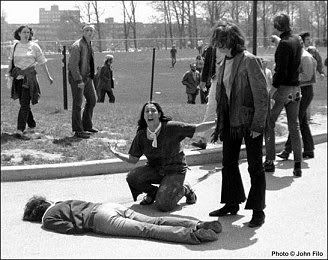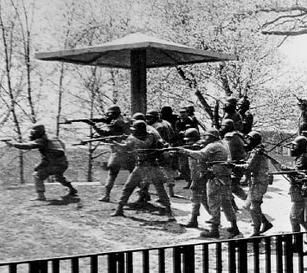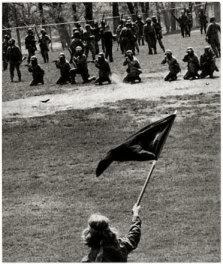Tin soldiers and Nixon comin',
We're finally on our own.
This summer I hear the drummin',
Four dead in Ohio.
~ Ohio, Crosby, Stills, Nash and Young

Had he not been gunned down by National Guard troops on the Kent State University campus on May 4, 1970, Jeffrey Miller would be 56 years old this year. Instead, Miller's life ended at age 19 and the thing for which he will forever be remembered is being the body over which young Mary Ann Vecchio cried in despair in a Pulitzer Prize-winning photo that quickly came to symbolize a deeply-divided nation.
It was 36 years ago today that Miller, Allison Krause, Sandra Scheuer and William Schroeder,
were massacred by Army National Guardsmen at a Vietnam war protest on the Kent State campus. It was a watershed event that touched off a nationwide student strike that forced hundreds of colleges and universities to close and signaled the zenith of American opposition to that war.
Miller and Krause had been involved in the demonstration while Scheuer and Schroeder were simply walking across campus between classes when the shooting started. Nine other students were wounded in the shooting, in which the soldiers fired 67 shots at the unarmed youths in a strong-arm effort to disperse the crowd before yet another day of protests could begin on the unsettled campus.
While the National Guard made a claim -- that has never been substantiated -- that a sniper had fired on the Guardsmen and some later testified that they were in fear for their lives, the closest of the four students killed (Miller) was almost 100 yards away and most of the wounded were not much closer.

The shootings chilled the nation, galvanized a generation and left millions asking how something like that could have happened in America.
Could the same thing happen in our country today? Without a shadow of a doubt. Indeed, I would argue that only one thing keeps the same kind of event from happening many times over in George W. Bush's America -- the absence of a military draft.
The shootings at Kent State were the culmination of four days of loud and large demonstrations by students, who were protesting the American invasion of Cambodia which President Richard Nixon had launched on April 25. The invasion further inflamed students as they had already seen educational deferments become more difficult to achieve and believed that the expansion of the war into another country increased their risk of being drafted.
I believe this sad occasion is a fitting day to think about the similarities between the Iraq war and Vietnam and the comparable effects it may soon have on a new generation. With Vietnam, our government misled the nation into war, gave an unrealistic estimate of how long and difficult the conflict would be and promised to liberate a struggling people from oppressors. And, with television truly coming into its own, the bloody fighting was beamed into living rooms on a nightly basis.
Sound like what's happening right now?
For even scarier similarity, read the words of former Kent State student Dean Kahler, now 57, who was shot in the lower back and left paralyzed on May 4, 1970. Kahler talked in 2000 about his thoughts immediately after Nixon's announcement of the Cambodia invasion.
"When he made the announcement, a very defiant announcement that we were invading Cambodia, he didnt care what people thought about it -- that's the impression I got and that many of my fellow students got at the same time too. To me, it didnt make sense. Why were we expanding the war when he was talking about ending the war and bringing our troops home and getting out of there?
"We were invading another country. I thoroughly agreed with the history and political science department at Kent who, the next day, on May 1st, buried a copy of the Constitution because they felt that he had overstepped his powers as Commander-in-Chief by sending troops into another country. The mood kind of changed on campus at that point in time."
The draft ended 33 years ago and the ambivalence today's students seem to feel toward an Iraq war so remarkably similar to Vietnam can undoubtedly be traced to a lack of personal connection to the war and any risk that it will disrupt -- or end -- their lives. But what if a draft became their reality today? With our military perhaps more stretched than it was with Vietnam and with the looming specter of our fatigued military being overwhelmed with a new war with Iran, you can bet a new spirit of activism would suddenly emerge on campuses nationwide.

Nothing would personalize a war to America's youth and their parents like the prospect of being forced to trade in the frat house for a rifle and an unarmored Humvee. I bet it would even make some of the Young Republicans on college campuses take a hard look at the rationale for war if there was even a smidgen of a chance they would actually have to fight.
And it may not be far away.
Congressman Charles Rangel (D-NY) has proposed restoring the draft, but more as an antiwar tactic to shock Republicans into reality -- that calling us a "nation at war" would have a huge public-relations cost if it ever went beyond simply being a White House buzz phrase and they actually had to start taking young people against their will.
Republican Senator Chuck Hagel of Nebraska has flat-out said that mandatory military service is going to have to be considered in light of what he described as a generational war against terrorism. Two years ago, when things were actually going
better in Iraq, Hagel commented that "deteriorating security in Iraq may force the United States to reintroduce the military draft."
And, of course, there's Congressman Jack Murtha (D-PA), who has said that the only way to increase the size of the armed services fairly is with a draft.
Indeed, Murtha expressly addressed the need for conscription in his controversial House resolution in November, 2005, calling for a phased withdrawal of U.S. troops from Iraq, saying "Whereas additional stabilization in Iraq by U, S. military forces cannot be achieved without the deployment of hundreds of thousands of additional U S. troops, which in turn cannot be achieved without a military draft."
Even people like Representative Jim Turner (D-TX), a member of the House Armed Services Committee, who realizes what a political firestorm a draft would create, admits that it could easily happen. We need to be prepared to have one, said Turner, when asked recently about the possibility if there is another major conflict in the world.
And does anyone really doubt that we could end up fighting somewhere else with Bush and a Republican Congress in charge? In addition, we have troop casualties reaching levels unseen since Vietnam, tours of duty being extended and many battle-weary troops returning to Iraq for second and third deployments. How low does the supply of trained, willing troops need to get before the draft is brought back and aren't we staring at that nearby horizon right now?
With Team Bush, we also have an administration that lied us into a war, outs covert CIA agents, performs illegal spying on American citizens and is riddled with corruption. As we deplete the U.S. military in Iraq and posture more aggressively with Iran -- and possibly North Korea -- a renewed military draft begins to look almost inevitable. And, when it comes to the notion of pulling out all the stops to stifle dissent at home, George W. Bush will make Richard Nixon look like Ghandi.
So as we commemorate the 36th anniversary of the Kent State shootings, we should look at that terrible day when four young college students quit getting older and a bad war truly came home and ask how far we are from that happening all over again.
Perhaps the fear of being drafted to fight in one of Bush's wars would actually make today's college students awaken from their collective slumber and begin protesting the state of their world. If that happens, they will soon see the tin soldiers coming once again -- except this time, they'll have bigger guns and, undoubtedly, an even more profound mandate for making the voices of dissent speak no more.
To learn more about the Kent State Shootings, visit May4Archive.org and Reese's May 4, 1970 page.
You can reach Bob Geiger at geiger.bob@gmail.com and read more from him at Democrats.com.